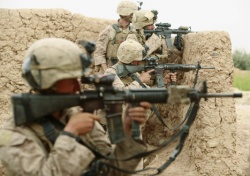War
War (yuddha) is a situation where two or more countries or groups engage in armed conflict with each other over an extended period. As war grows out of fear, greed or hatred, and always involves killing, Buddhism considers it to be against the first Precept. The Tipiṭaka occasionally mentions wars but says almost nothing about their horrors and miseries. We read of a commander telling his men that when they take the city they are laying siege to, they can use the inhabitants’ heads like pumpkins (Ja.VI,400). The Buddha describes a soldier’s dread before going into battle, saying: ‘his heart sinks, he is dejected and he cannot brace himself.’ (saṃsīdati visīdati na santhambhati, A.III,89).
In times of national danger religious leaders have often tried to motivate soldiers to fight by telling them that if they die bravely on the battlefield they will earn a place for themselves in heaven. This useful but spurious idea was current in ancient India and is mentioned in the Bhagavad Gītā (II,32-7) and several other religious texts. Once the Buddha was asked by a soldier if this claim was true but he declined to give an answer. The soldier persisted with his question and finally the Buddha replied. He said that if a soldier had such thoughts as ‘Let these beings be killed, slaughtered, wiped out, exterminated’ at the time he himself was killed he would probably be reborn in purgatory (S.IV,309). The Mahāvastu likewise says that purgatory awaits those who ‘put weapons of war in men's hands, urging them to smite this village, that town, this city, or smite this man or that animal.’
Buddhist philosophers and thinkers never compromised on the idea that war is evil, and so never evolved the concept of a holy war, crusade or jihad, or of a just war. Despite this, it would have to be admitted that a modicum of good sometimes may come out of war. In 262 BCE King Aśoka ordered the invasion and annexation of Kāliṅga (modern Orissa). According to his own words: ‘A hundred and fifty thousand were deported, a hundred thousand were killed and many more died from other causes.’ Realizing what he had been responsible for, Aśoka turned to Buddhism and gave up a policy of aggression. He publicly acknowledged that he felt ‘deep remorse’ (anusochana) for what he had done. ‘Now the king is deeply pained by the killing, dying and depopulation that takes place when an unconquered country is conquered.’ India enjoyed a long period of peace, at least while Aśoka reigned.
The Suvarṇaprabhāsottama Sūtra expresses the wish for a war-free world in these words. ‘Protect all the dynasties, cities, lands and provinces, save them, guard them, shield them from invasions, give them peace and prosperity. Keep them free from fears, disasters and evil portents. Turn back the armies of their enemies and arouse in all the kings of India the desire to avoid conflicts, invasions, quarreling and disputing with their neighbours. When all the kings of India are content with their own realms, their own borders and their own wealth, they will not fight with each other or create mutual strife ... they will be content with their own realms, they will not conquer each other or exercise their strength by laying waste to whole provinces. When all the kings of India think of their own and others’ welfare, India will be rich, with abundant food, pleasant and populous.’ (condensed).
Individual Buddhists may consider that at times participating in a war might be the lesser of two evils, and thus unpalatable but necessary. Other thoughtful Buddhists might refuse to be involved in war no matter what the circumstances. However, wars do not break out suddenly; they usually come at the end of a period of tension and fear. The most consistent Buddhist response to war is to deal with its causes before they get to the point where armed conflict becomes inevitable. The political history of Buddhist countries have been as full of wars as most other countries. However, wars fought for purely religious reasons or to promote Buddhism, have not been common.
‘Aspects of the Buddhist Attitude to War,’ L. Schmithausen in Violence Denied ed. by J. Houben and K.Van Kooij, 1999.

